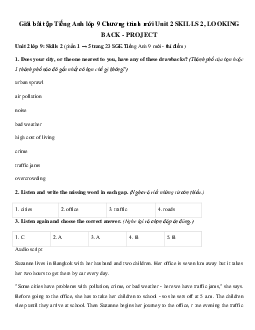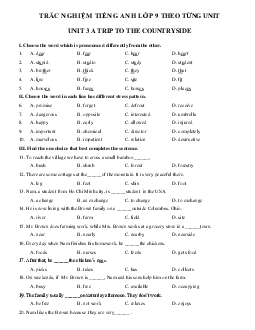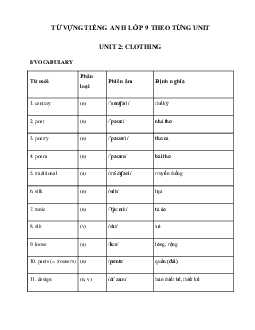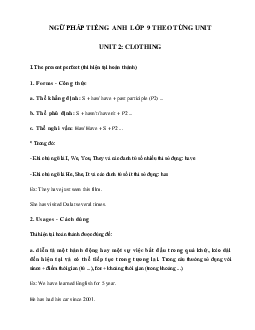






Preview text:
GIẢI SBT TIẾNG ANH LỚP 9 THEO TỪNG UNIT UNIT 2: CLOTHING
1. (trang 15 sbt Ti ếng Anh 9): Make sentences about the following people.
a) Tom has been an explorer for 10 years.
He has been to the North Pole.
He has never seen polar bears.
b) Sandra has been a tennis player since she was 10 (years old).
She has won a senior competition.
She hasn't played at Wimbledon.
c) Jack and Jill have been unemployed for 2 years.
They have applied for some jobs around the country. They haven't got any jobs.
d) Lien has worked as a doctor since 2001.
She has saved many sick people.
She herself has never been ill.
e) Nam has been an interpreter for 5 years.
He has translated at/ for some international conferences.
He has not been to any English speaking countries.
2. (trang 16 sbt Ti ếng Anh 9): Put the verbs into the correct form: present
perfect or past sim ple. a) bought f) did/ start b) has had
g) didn’t eat/ didn’t feel
c) arrived/ had/ went h) Have/ washed d) Did/ visit i) didn’t/ want e) has taken j) have never met
3. (trang 17 sbt Ti ếng Anh 9): Make up dialogues.
a) A: Have you ever read the short stories by Jack London? B: Yes, I have. A: When did you read them? B: I read them in last year.
b) A: Have you ever had your name in the newspaper? B: Yes, I have.
A: When did you have your name in the newspaper?
B: I had it in the newspaper in 1999.
c) A: Have you ever been to China? B: Yes, I have. A: When were you there? B: I was there last summer.
d) A: Have you ever been on television? B: Yes, I have.
A: When were you on television?
B: I was on television just 4 minutes ago.
e) A: Have you ever spoken English to a native speaker? B: Yes, I have.
A: When did you speak English to him/ her?
B: I spoke English to him/ her last Sunday at the Inter-Shop.
f) A: Have you ever visited Ha Long Bay? B: Yes, I have. A: When did you visit it? B: I visited it 3 years ago.
4. (trang 18 sbt Ti ếng Anh 9): Read the passage. a, 1. was 2. became 3. has been 4. has written 5. has been 6. is 7. have 8. lived 9. live 10. have lived b,
1. When did he go to university?
2. How long has he been a university professor?
3. How many books about education has he written?
4. Has he ever written a book about disabled children? 5. Who(m) is he married to?
6. How many children do they have?
7. When did they live in the suburb of London? 8. Where do they live now?
9. How long have they lived in the center of the City?
5. (trang 19 sbt Ti ếng Anh 9): Com plete these sentences with one of the
foIlowing verbs in the correct form. a) be translated f) was checked b) were woken g) be found c) were made h) has been cleaned d) was arrested i) are caused e) will be knocked
6. (trang 20 sbt Ti ếng Anh 9): Read the fírst sentence, and then complete
the second sentence with the same meaning.
a) This dictionary isn't used very often.
b) Oil has been found in the Antarctic.
c) Mary was given this present an hour ago.
d) Her new book will probably be translated into a number of foreign languagues.
e) Has this telephone been repaired?
f) I was told that our teacher was sick.
7. (trang 21 sbt Ti ếng Anh 9): Read a sentence and write another sentence
with the same meaning.
a) The flight had to be canceled because of the bad weather.
b) The project must be finished on time.
c) A cure for cancer can be found in the near future.
d) Your bike might be stolen if you leave it outside.
e) The old building ought to be knocked down.
f) The 22nd SEA Games were held in Viet Nam in 2003.
8. (trang 21 sbt Ti ếng Anh 9): Make passive sentences from the words in brackets.
a) Every week it is watched by millions of people.
b) Are most of them exported?
c) Five young men were arrested. d) Was anything taken?
e) When was it abolished? f) It has been stolen!
g) They haven't been seen since then.
h) Has it been painted?
i) But nobody was injured, so it wasn't needed.
9. (trang 22 sbt Ti ếng Anh 9): Complete the sentences, using the names given in the box.
a) The Mona Lisa was painted by Leonardo da Vinci.
b) Hamlet was written by William Shakespeare.
c) The television was invented by John Logie Baird.
d) The Moonlight Sonata was composed by Ludwig Van Beethoven.
e) Radium was discovered by Marie Curie.
10. (trang 23 sbt Ti ếng Anh 9): Read the passage and complete each gap
by choosing the correct word A, B, C or D. 1. B 4. C 7. C 10. D 2. A 5. D 8. B 11. A 3. A 6. C 9. A 12. D
11. (trang 24 sbt Ti ếng Anh 9): Complete each sentence with the correct
form of a suitable word or a phrase from the box. a) to take off f) took off b) dresses g) to wear c) to dress up h) put on d) matched i) Put on e) wears j) dressed
12. (trang 24 sbt Ti ếng Anh 9): Read the following passage and answer
the multiple-choice questions. Circle the letter A, B, C or D.
1 - D; 2 - C; 3 - C; 4 - B; 5 - B;



